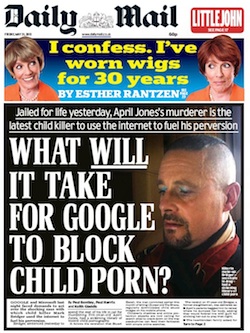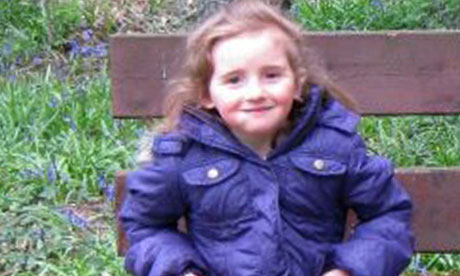 |
| With extreme internet content once again in the spotlight, are arguments surrounding "blocking sites/content" fundamentally flawed? (Pic : BBC) |
At this week's FMQs, there was this (edited) exchange between Russell George and Carwyn Jones :
Russell George AM (Con, Montgomery) : In light of this horrific case (April Jones murder), there have been increased demands....across the UK, that internet companies such as Google should take tougher action to stamp out images of child abuse and pornographic sites online. What discussions have you had with the UK Government and other devolved administrations on this....to adopt a zero-tolerance policy in relation to such content?
Carwyn Jones : There are some that take the view that the internet should be as uncensored as possible. I do not take that view when it comes to....child pornography. I cannot see what advantage there is in allowing unfettered access to something that would be a crime if it were published in a magazine....I am willing to write....to the Prime Minister to ask him what his response might be....I would certainly....pursue this to the greatest extent that I can.
A few months earlier – on 5th February, Safer Internet Day - there's this related exchange during FMQs. Here's a edited version of what the First Minister said in response to an initial question from Gwyn Price, and follow ups from Bethan Jenkins (Plaid, South Wales West), William Graham (Con, South Wales East) and Rebecca Evans (Lab, Mid & West Wales) on the issue of internet safety and online content.
Initial Question, Gwyn Price AM (Lab, Islwyn) : Will the First Minister make a statement on what the Welsh Government can do to stop children accessing age inappropriate material online?
Carwyn Jones : Of course, we cannot stop it completely as we do not control the internet. However, we recommend....ISPs encourage parents to enable parental controls. We are working to ensure that resources are available for educating children on appropriate use of the internet.
We have worked with UK Safer Internet Centre to provide bilingual school packs....(lesson plans etc)....I know the Children's Commissioner is also working to raise awareness of the issue. One of the best ways of doing that is to ensure that....parents are able to be informed....of what can be done to restrict internet access to harmful sites.
It's difficult to restrict access in the home....It is often difficult to understand what age-appropriate content is. For example, the age certification system...for video games....is different for that for films. It's important we are in a position to educate children....and parents as well. Directors general within the Government have been asked to hold discussions....with a view to formulating.....a Welsh Government policy in terms of what is age-appropriate material....I will report back to Members about progress of that work.
It is important that parents understand what their children are accessing online....and what they're saying through websites like Facebook. The (Hwb e-learning) platform allows us to centrally host e-safety resources....available to all 3-19 year olds, and will also enable teachers to raise awareness of....online safety with pupils and parents alike.
I don't think there's much argument against what the First Minister said in both cases. It's clear he doesn't support a "clamp down" on the internet as an open forum. What he's referring to is child pornography and other online criminal activity. I think we'd all agree with that.
The First Minister - and the other AMs - mean well, and their calls for action are completely understandable.
However, the issue goes deeper than Google, and much deeper than simply blocking sites. Calling for search engines and ISPs to block content as if it's a magic cure is wide of the mark, because it shows a misunderstanding of precisely how it all works in the first place.
Beyond Google - The internet's dark underbelly
 |
| This is usually how criminal activity online is sourced and distributed - and not a search engine in sight. (Pic : The Australian) |
The only way you can access it is through anonymous networking using applications like Tor, or sharing illegal content via peer-to-peer (P2P) file-sharing. Search engine "bots" – which find content for sites like Google – simply don't work there. So hardly anything in the "deep web" actually makes it to the "surface" – including child pornography.
Paedophiles are caught out either when the content's found on their computer, they're identified via that content, or via "sting operations" carried out by the likes of the Child Exploitation and Online Protection Centre (CEOP).
Things like Tor and P2P are impossible to police. It's probably the main reason why wide-ranging blocks and filters haven't been introduced yet. It's very easy to get around, policing it would also be very resource intensive and the technological requirements are daunting.
To completely eliminate the problem, you would need to fundamentally change how the internet works. That could be by developing a Chinese-style "walled garden", where only approved sites are allowed - which would end the internet as an open forum and would be an extreme reaction. There's also blocking secure traffic, which would end internet shopping, gaming and banking overnight.
You simply can't look up extreme content via search engines like Google. In fact, the Internet Watch Foundation (IWF) has a blacklist to block sites, with co-operation from ISPs. The panicked thrashing about "making Google live up to their responsibilities" or "blocking child abuse sites" is unlikely to have any impact.
 |
| They can try it, but it won't work. (Pic : blogistan.co.uk) |
Also, under UK law, even looking at child pornography is a criminal offence. So journalists claiming they've seen it should be expecting a knock on the door then? Brown trousers at Daily Mail towers, surely?
If an automated filter were set up, it's likely to flag up "false positives" due to image labelling. An image of a child in a nappy might be blocked, while real child abuse – labelled with some encryption – would pass. A famous example being the temporary blocking of Scorpion's Virgin Killer album cover on Wikipedia (it's probably best not to look it up) by the IWF.
Basically, it's media campaigners pressuring people, politicians, search engines and ISPs to "try and do something", that's not likely to solve the underlying problem in the first place, and instead lead to the creation of a filtering system that will likely block "legitimate" content instead.
Like it or not - and however distasteful it might be - things like adult porn are legitimate. There are also plenty of ways you can block that already.
Looking for answers to the unanswerable questions
 |
| We all want to know "why"? However, it probably doesn't lie on the internet, more in the head of one sick individual. (Pic : The Guardian) |
I hate to say this - as I would like to see something done too - but it's all a load of poop. People and newspapers are embarrassing themselves by debating it in such 2 dimensional terms.
I think Carwyn got it right in his Feb 5th responses : better use of parental controls, better awareness, better reporting and flagging of criminal online content (including the system proposed by April's parents) and add top quality investigations by CEOP to that too.
In my opinion, many people look for the easiest way to explain activities that defy the boundaries of normal behaviour – and there's nothing that defies those boundaries quite like a child murder.
"Why?" is always the hardest question to answer in cases like that.
Children have been abducted, abused, raped and murdered long before the internet existed. The lack of an internet didn't stop Jimmy Savile, did it? Or the Moors murderers? Clamp down on the illegal stuff by all means, but blaming "the internet" is reminiscent of arguments that "video nasties", violent computer games and Marilyn Manson turned people into monsters. All largely disproven.
Ultimately, Mark Bridger killed April Jones because, for whatever reason, he knew what he was doing and wanted to do it – like all murderers. He just happened to be a paedophile as well, further adding to the revulsion, misery and outrage surrounding his heinous crime.











0 comments:
Post a Comment